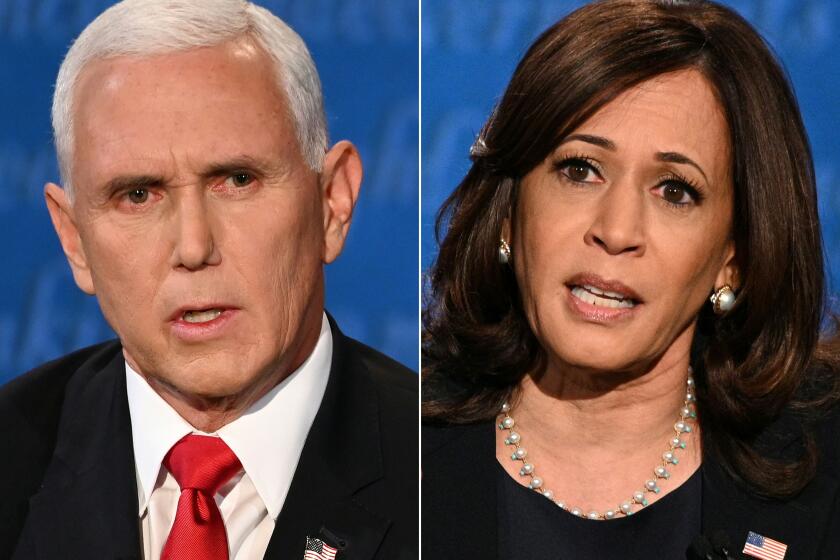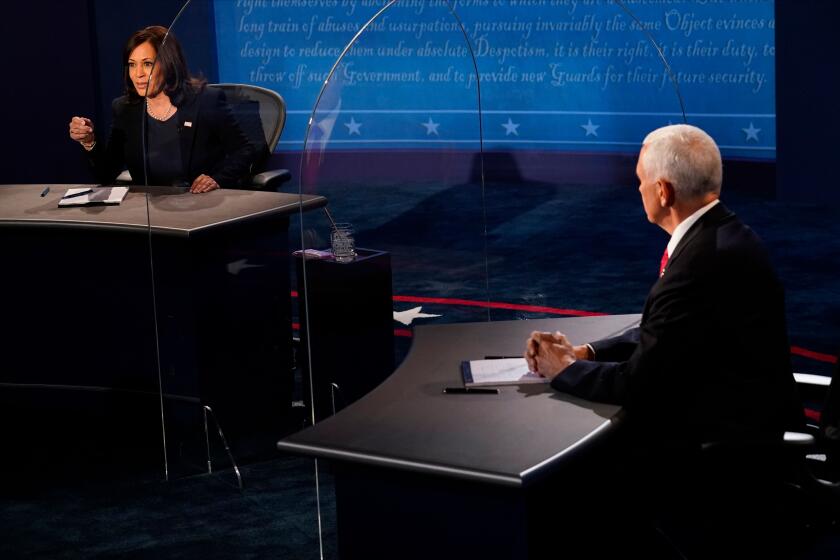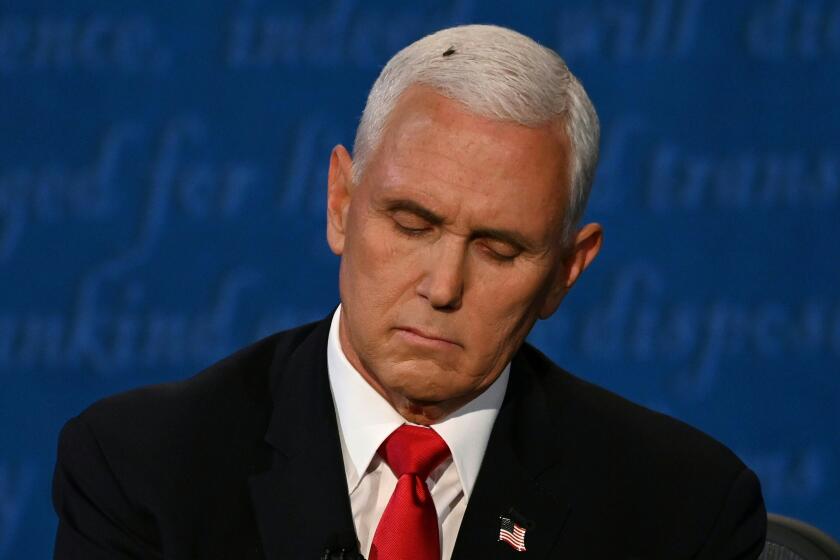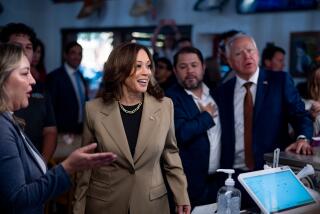News Analysis: Harris, Pence defend their tickets with an eye on their political futures
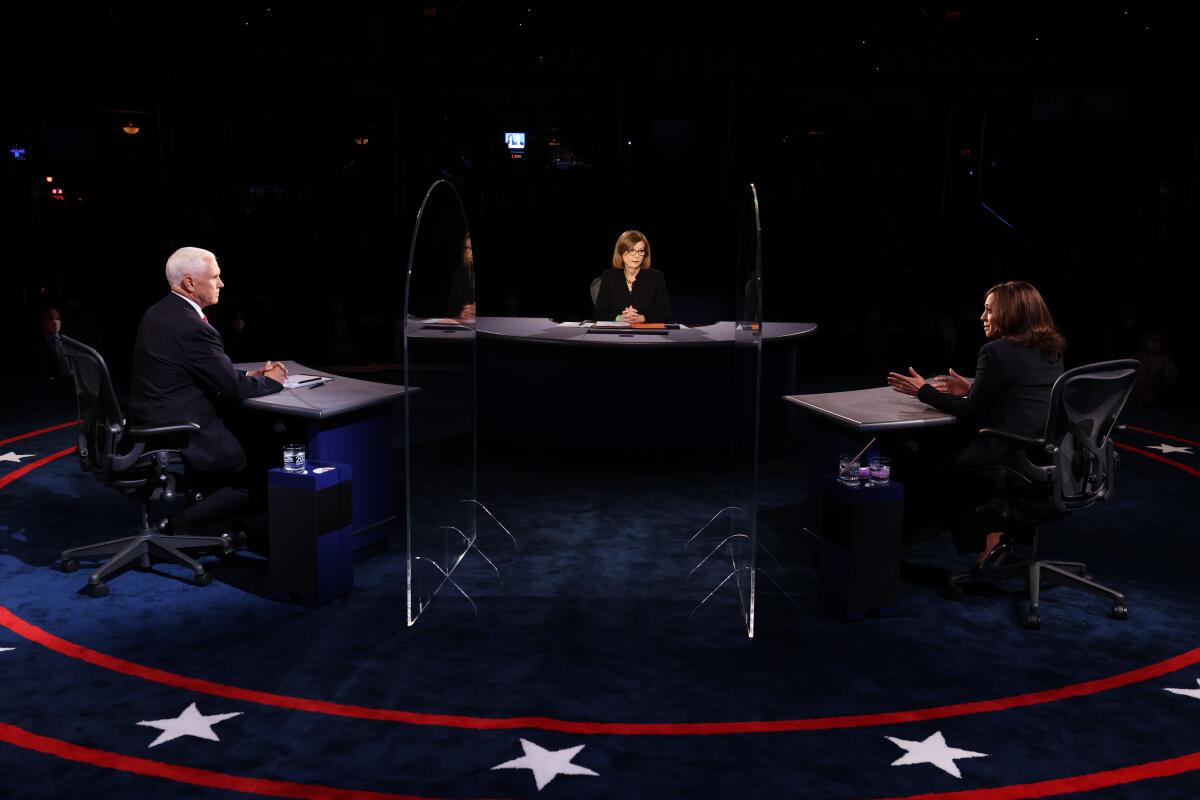
WASHINGTON — Kamala Harris stepped into the highest-profile moment of her political career Wednesday night, deploying what she has long touted as her superpower: her ability to “prosecute a case” against the Trump administration.
In her debate with Vice President Mike Pence, Harris used her skills as a former prosecutor to attack President Trump for his handling of the coronavirus crisis and the economy with a clarity that eluded her running mate, Joe Biden, in his chaotic debate with the president last week.
“The American people have witnessed what is the greatest failure of any presidential administration in the history of our country,” she said, decrying the administration’s “ineptitude.”
The debate — far tamer and more coherent than the Trump-Biden slugfest — may not make much difference in the outcome of this fall’s election, but it could count as Harris’ first audition for the next one.
As running mate to the 77-year-old former vice president, Harris is in the pole position for a future presidential bid, but she will not be uncontested in what will likely be a fierce internecine fight between progressives and more centrist Democrats.
Vice President Mike Pence struggles to revive the flagging Trump campaign as Sen. Kamala Harris rebukes the administration over its COVID-19 response and more in the pair’s tense but relatively civil debate in Salt Lake City.
Harris’ debate performance was “very helpful to the ticket going into November. It’s also helpful to her brand when you look to November and beyond,” said Cornell Belcher, a Democratic pollster.
Pence headed into the debate in a similar position: As vice president, he should be Trump’s political heir, but other ambitious Republicans, including some who share the president’s last name, are already eyeing the post-Trump White House.
The debate tested Pence’s unshakable loyalty to Trump, which is his strongest claim to the future support of the president’s followers.
“You really could be seeing a preview of 2024,” said Jon Thompson, a former advisor to Pence. “This could be the first debate of 2024 because they could be the standard-bearers of their party.”
Harris is no favorite among Democrats’ growing progressive wing, and she has slipped a bit further to the right to align with Biden’s agenda. Pence faces an array of ambitious, more-Trumpy Republicans already waiting in the wings. But as running mates to a pair of septuagenarians, one infected with COVID-19, Harris and Pence are closer to the Oval Office than any other people in America.
Ironically, as they faced off, Pence did his best to portray Harris as the candidate the Democratic Party’s left would like her to be, citing her past support for the Green New Deal, opposition to fracking of natural gas deposits and other policies that Biden has not embraced.
Referring to her “radical environmental agenda.” Pence said, “That is probably why the Newsweek magazine called Kamala Harris the most liberal member of the United States Senate in 2019, more liberal than Bernie Sanders.”
It was the latest version of a Republican campaign ploy that often makes it seem like Trump would rather run against Harris than Biden, a centrist who has proved relatively impervious to Republican efforts to portray him as a dangerous radical with a socialist agenda.
The two avoided a repeat of the Trump-Biden demolition derby, but still hit hard and often
Trump regularly evokes Harris’ name on Twitter and the campaign trail, painting her as a progressive puppet-master who will yank Biden toward radicalism.
In Wednesday’s debate, Harris repeatedly minimized her past differences with Biden and dedicated herself to defending and promoting him and his plans.
Like Biden, she dodged a question about an emerging progressive passion — the idea of expanding the Supreme Court, to overturn a solidly conservative majority among the justices that Democrats say was unfairly obtained.
Pence answered the question for her: “The straight answer is that they are going to pack the court if they win this election.”
Harris came to the debate — almost surely the most important appearance she will make for the Democratic ticket — with much to prove.
She is little known to many American voters, so she made a point of providing pieces of her life story — born to immigrants in Oakland, her career as a prosecutor and her path-breaking achievements as a Black woman. She is untested on matters of foreign policy, and it is not clear the debate would resolve doubts about her qualification to be a “heartbeat away” from the presidency. She mentioned she was on the Senate Intelligence Committee, and quoted Biden on the importance of rebuilding relationships with U.S. allies.
The event showcased Harris’ strengths and weaknesses as a debater, which had become clear in her unsuccessful presidential campaign. She is skilled at delivering scripted attack lines with punch and flair — as she did in her show-stopping questioning of Trump nominees in the Judiciary Committee and her attack on Biden’s civil rights record in the first primary debate. She was less skillful in parrying attacks.
During the vice presidential debate Wednesday, many were fixated not on the arguments — but on Mike Pence’s left eye and a fly in his hair.
Although there were no knockout punches Wednesday, Harris came armed with barbs. She parlayed a question about health record transparency to land a blow by reminding viewers of reports that Trump paid little or no federal income taxes. Responding to Pence’s attacks on the economy, she pounced on him for voting against legislation to bail out the auto industry.
Her attacks on the administration’s efforts to overturn the Affordable Care Act provided one of the night’s most memorable lines, a warning to Americans with preexisting health conditions that “they’re coming for you.” And her repeated rebukes of Pence’s attempts to interrupt her could strike a sympathetic chord with many women voters.
For his part, Pence’s burden was to defend a president who is under fire, weakened by a COVID-19 infection, lagging in most polls — with a clear understanding that his own political future will be grim if he is only a one-term vice president. Pence clung to Trump tightly, never trying to distance himself.
His biggest vulnerability was that he was in charge of the administration task force that managed the coronavirus, which a significant majority of voters see as a failure. He came with a quip against Biden when he said the Democrats’ plan sounded a lot like what the Trump administration was already doing.
“It looks a little bit like plagiarism, which is something Joe Biden knows a little bit about,” he said, referring to accusations that drove Biden to quit his 1988 presidential campaign.
Despite the collapse of the economy since the pandemic hit, Pence gamely predicted great things in a second Trump administration.
He did part ways markedly with Trump on style: He was polite, even making a point of congratulating Harris on her historic nomination. He was more disciplined and controlled than Trump in making the case against the Democrats, although he repeatedly ignored the moderator and talked over his time limits.
But mostly, he deployed none of the bluster and bravado that Trump used to disrupt his debate with Biden — and his entire presidency. That may have made for a better debate, but could also raise questions about whether Pence is Trumpian enough to hold Trump’s party together in the future.
Times staff writer Melanie Mason in Wilmington, Del., contributed to this report.
More to Read
Get the L.A. Times Politics newsletter
Deeply reported insights into legislation, politics and policy from Sacramento, Washington and beyond. In your inbox three times per week.
You may occasionally receive promotional content from the Los Angeles Times.
